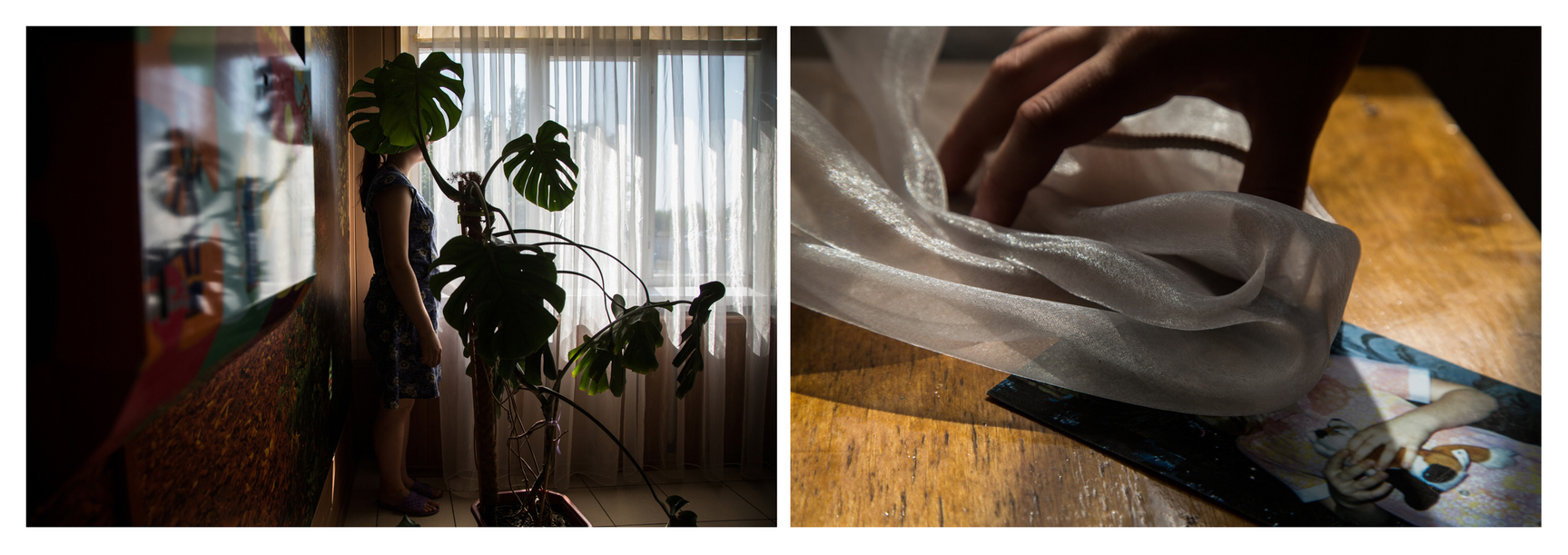

"I would like to tell a story about my toy that was given to me by my stepfather. He died of a disease after my mother separated from him. We continued to be in touch, but later on I accidentally dropped this toy into a fire. This picture will always remind me about my stepfather. Always!" -- Ksusha
Festival of Memory
Gabriela Bulisova and Mark Isaac | Ukraine
Photographer: Gabriela Bulisova and Mark Isaac
Exhibit Title: Festival of Memory
Location: Ukraine
“Festival of Memory” focuses on the important recollections of residents of a penal colony for young women in the city of Melitopol, Ukraine. We created diptychs with the participating women that include a portrait of each individual and an image of an object, place, photograph that is particularly important to their memory. In some cases, the women are minors, so their faces cannot be shown. They were also interviewed about the object they selected, and their explanations are included as text.
For women who are incarcerated, memories are particularly important to their identity. In fact, the interviews reveal that memories need not be solely focused on the past, but can be an inspiration to take action for the future.
Melitopol is a multicultural city that, prior to the Russian annexation of Crimea, was known as the gateway to the Crimean Peninsula. “Festival of Memory” was funded by Tandem and the Warsaw Museum of Modern Art. It was organized by Open Place in Kiev, Ukraine, and it was carried out in cooperation with the Melitopol Museum.
FESTIVAL OF MEMORY
Gabriela Bulisova and Mark Isaac
In August 2015, Gabriela Bulisova and Mark Isaac worked in the only penal colony in Ukraine for women ages 14-20, which is in the southeastern city of Melitopol. The project, titled “Festival of Memory” focused on the important recollections of the women living in the penal colony.
For 13 participating women, we created diptychs that include a portrait of each individual and an image of a place, object, photograph, or article of clothing that is particularly important to their memory. The diptychs allow the viewer to simultaneously focus on each individual woman and the object of importance to her memory. (In some cases, the participating women are minors, so their faces cannot be shown.) The women were also interviewed about the object they selected, and their explanations are included as text.
For women who are incarcerated, memories of other times and places are particularly important to their identity. In fact, the interviews reveal that memories need not be solely focused on the past, but can be an inspiration to take action for the future.
We've been working on incarceration issues in the United States for almost six years. It's very difficult, if not impossible, to gain access to prisons, jails, and juvenile facilities in this country. So, when we requested access to the penal colony for women in Melitopol, we thought our chances were negligible. But after answering numerous questions about the reason for our request and sending scans of our passports to the Ukrainian police, we were given permission to work in the colony.
It wasn't until we arrived there in person and met with the administrators that we realized they were granting us sweeping access to the individual women, their bedrooms, their classrooms, and their workplaces. We were even more surprised to see the living conditions and the relationships between the teachers and the women. Everything was meticulously clean and orderly; the rooms were airy and cheerful; and the closeness and warmth of the staff was authentic and nurturing. The women learn skills, and some study subjects like English literature, geography, and teaching. In summary, it’s shocking how advanced this facility is compared with most juvenile facilities in the United States, especially since the Melitopol penal colony gets by on a shoestring budget in a nation challenged by poverty and war.
Over the period of five days working in the penal colony, we developed a very close working relationship with many of the young women and the staff, and it was emotional and sad for us to leave them. We hope to follow up on this story in the future to follow the progress of the women, particularly as some of them are released. We also hope to make Festival of Memory an ongoing project that builds a common understanding of the importance of memory to people in different parts of the globe.
Festival of Memory was part of a larger initiative sponsored by Tandem (http://www.tandemforculture.org/collaborations/at-the-heart-of-community/) and supported by the Museum of Modern Art in Warsaw, Poland (http://artmuseum.pl/en). The project was directly organized by the Open Place artist collective in Kiev, Ukraine (www.openplace.com.ua), which is devoted to an exchange of opinions and ideas between artists and curators in Ukraine and other countries. It was carried out with the close collaboration of the Melitopol Municipal Museum of Local History (https://melitopol-museum.jimdo.com/about-us/) in Melitopol, Ukraine. The larger project sought to help define the role of a socially minded institution that can contribute to the revitalization of the cultural sector in Ukraine by addressing key issues, including: How is the public memory shaped? What is the role of a small museum in the life of society? How is the development of cultural institutions linked to the development of society? Festival of Memory was one of several key contributions by collaborating artists to this initiative.
Make Comment/View Comments